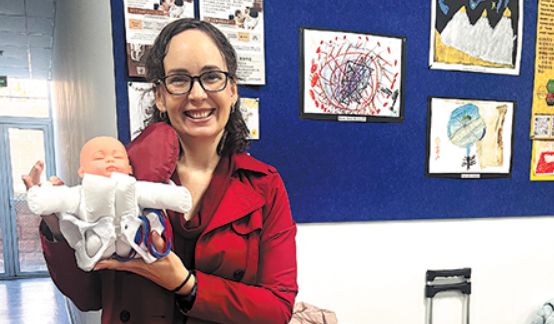
Ruth Greene takes part in the Christmas Fair at the International School of Qingdao in Shandong on Nov 30, 2024.[Photo / China Daily]
According to China's seventh national census in 2020, more than 800,000 foreigners live in the country. Among them is a special group: foreign expectant mothers who choose to give birth in China.
These women have experienced significant life moments here and gained valuable insights into the contrasting approaches to maternal care between the East and the West.
Ruth Greene, an American who has lived in China for over 16 years, knows this journey well. After giving birth to three children in the country, she has become an expert in childbirth and postpartum care across the two cultures.
Her first child was born in 2010 at a private hospital in Qingdao, Shandong province. At the time, she had to rely on a translator nurse to navigate prenatal checkups and the delivery process.
Despite receiving quality care, the language barrier limited her understanding and involvement.
This experience made Ruth aware of the cultural differences in maternity care.
"A lot of Westerners have a strong belief in self and the ability to make decisions for themselves, and want to have all the information," she said. "Whereas in China, there is a deep-seated belief in the experience and wisdom of doctors."
These differences also extend to postpartum care, where China's yuesao, or maternity matrons, play a vital role.
Ruth likens this function to that of a doula in the West, as both provide comprehensive care for the mother and newborn.
"Yuesao are expected to do everything — some even oversee all of the feeding, cooking, or whatever it might be," she noted. "A postpartum doula, on the other hand, focuses on what the mom needs and teaches her how to do it for herself."
As Ruth observed, while yuesao help new mothers navigate the early challenges of motherhood, doulas prepare parents for the transition to managing on their own.
"Everybody has the same goal of wanting mama and baby to be healthy, but sometimes that can look different from different viewpoints," she concluded.
Cultivating expertise
Determined to better handle future childbirth experiences and support other foreign mothers in China, Ruth devoted herself to learning Mandarin and becoming a certified doula, gaining a deeper understanding of professional practices.
In 2022, she co-founded the "Having a Baby in China" website and company with her husband and two friends, along with related WeChat groups.
They provide doula services, breastfeeding support, and consulting for foreign mothers in China as well as Chinese mothers in international marriages.
Ruth believes China is "a great place to be pregnant and have a baby for foreign mothers" because it offers a wide range of hospital options.
According to her, there is very affordable care in China as well as many personalized and private care services for those willing to spend more.
Ruth also wants to contribute to the industry.
That's why she founded the International Birth Workers of China, an organization that connects professional midwives, doulas, and childbirth educators.
The organization has hosted an annual conference for four consecutive years.
Last November in Ningbo, Zhejiang province, nine professionals working or volunteering in the childbirth industry gathered for a seminar series on topics such as pelvic floor health and dealing with biases.
"One of the things I'm passionate about is connecting birth workers across China, both Chinese and foreign, to work together so that we can improve the birthing experience for women," she said.
As she puts it, "Giving birth is one of the most difficult things somebody will go through in their life. But it can also be a really amazing experience."
 Editor:Li Lulu
Editor:Li Lulu